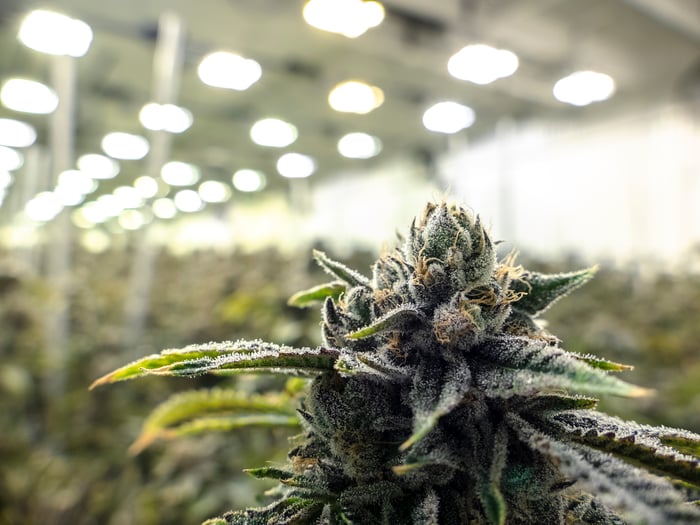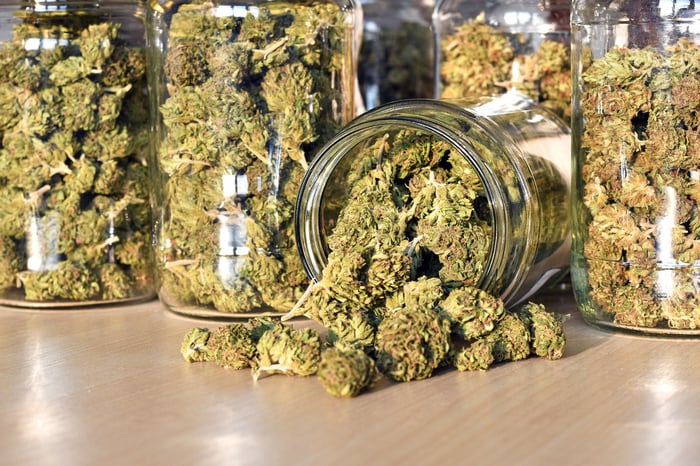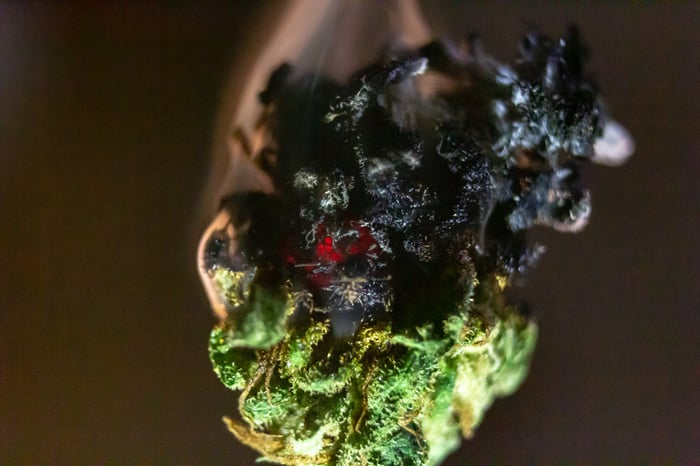As a whole, the stock market has had an incredibly good year. Through this past weekend, the iconic Dow Jones Industrial Average and broad-based S&P 500 had gained 20% and 25%, respectively, which trounces their historic annual average returns of 5.7% and 7%. Pretty much every industry looks to end the year on a high note... except the industry that actually makes consumers high: marijuana.
After beginning the year on a tear, with over a dozen pot stocks ending the first quarter higher by at least 70%, nearly all cannabis stocks have given up those year-to-date gains and now sit firmly in negative territory for 2019. And among the worst of the worst performers is the most popular stock in the world with millennial investors, Aurora Cannabis (ACB -2.96%).

Image source: Getty Images.
Millennial investors are infatuated with Aurora Cannabis
Recently, online investing app Robinhood released data on its 100 most held stocks. Robinhood is an online platform with more than 6 million users who average 32 years in age, suggesting that it's a particularly popular investing tool with millennials. Of the 100 most popular stocks, Aurora Cannabis sat at the top of the pack, with 568,973 members owning a stake in the company. Putting that into perspective, nearly one in every 10 members of Robinhood owns shares in Aurora.
What's more, it's not like any other companies are even remotely close to Aurora Cannabis in the ownership department. Ford and General Electric, two stalwarts that've also had pretty bad years, currently chime in as the second and third most-held stocks of the group, with 313,803 and 296,010 members, respectively. Aurora Cannabis nearly has the second most-held stock on the platform doubled up in terms of member ownership.
Relative to other marijuana stocks, it's not even close. Cronos Group, Canopy Growth, and Aphria are the respective ninth, 10th, and 28th most-held stocks on Robinhood with 184,179 members, 170,312 members, and 86,829 members, owning a stake. But even on a combined basis, these three brand-name weed stocks don't amount to the aggregate member ownership in Aurora Cannabis.

Image source: Getty Images.
Four reasons millennials can't get enough of Aurora Cannabis
What is it about Aurora Cannabis that today's millennial investors clearly can't get enough of?
One possibility might be the company's leading production potential. If Aurora were to develop all 15 of its grow farms, it could push for nearly 700,000 kilos of peak output per year, which is more than double all but two of its competitors. The presumption is that this huge output will aid the company in landing long-term domestic and international supply deals, as well as help lower production costs by taking advantage of economies of scale.
Another reason millennials are probably enamored with Aurora Cannabis is the company's push into overseas markets. No marijuana stock has a broader global presence than Aurora, with production, export, research, or partnership agreements in place in 25 total countries, including Canada. If significant oversupply or commoditization of dried cannabis flower happens in Canada, Aurora will have up to two dozen other external sales channels to move product.
Millennials are also probably counting on seeing Aurora strike a partnership with a brand-name food or beverage company in the not-so-distant future. The company has made no secret of its desire to entire the cannabis-infused beverage arena and wound up bringing billionaire activist investor Nelson Peltz on as a strategic advisor in March. Peltz has intricate knowledge of the inner workings of the food and beverage industry, making him the perfect bridge to seek a partnership in this space.
Lastly, I'd even suggest that millennials have been attracted to Aurora's puny share price, which sits at around $2.50. Although the notion is incorrect that it's easier for a stock with a $2.50 share price to double than, say, a $25 stock, this doesn't seem to be echoing with millennials, who'd rather own more shares of a lower-priced stock than a smaller number of shares of a higher-priced stock.

Image source: Getty Images.
Millennials' top investment goes up in smoke
Yet this top pick by millennials has lost 50% on a year-to-date basis, and close to 75% since hitting its yearly closing high in mid-March.
One of the biggest issues for Aurora Cannabis that few folks saw coming was the magnitude of supply problems in Canada. Regulatory agency Health Canada has done a poor job of managing its large backlog of licensing applications, which has effectively kept pot stocks from growing, processing, or selling marijuana. Meanwhile, select provinces, such as Ontario, have been exceptionally slow to approve dispensary licenses, leading to few stores where legal cannabis can be purchased. In effect, the black market has had the green carpet rolled out for it in 2019 in Canada.
Aurora Cannabis also isn't expected to begin generating significant revenue anytime soon from its international investments. The expectation from Health Canada has always been that Aurora would only begin exporting significant amount of cannabis when domestic demand was satisfied. But, as noted, this could take some time before it actually happens. That makes Aurora's robust international expansion sort of a moot point for now.
As a result of these issues, the company's operating results haven't been anywhere near up to snuff. Originally forecasting positive adjusted EBITDA (earnings before interest, taxes, depreciation, and amortization) during the fiscal fourth quarter of 2019, Aurora now looks as if it could continue losing money and burning through its cash on hand through fiscal 2021. This could mean ongoing share issuances to raise capital from a company that's already issued more than 1 billion shares over the past five years and diluted the daylights out of its shareholders.
And, lastly, Aurora Cannabis is lugging around close to $2.4 billion in goodwill, which is nearly equal to the company's current market cap. I find it highly unlikely that the company recoups a significant portion of this goodwill in the years to come, making a writedown the best means of cleaning up Aurora's ugly balance sheet.
In short, let this be a lesson that popularity does not equate to profitability in the stock market.





